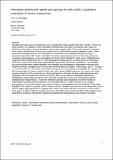Information-sharing with respite care services for older adults : a qualitative exploration of carers’ experiences
Abstract
Respite services play an important role in supporting older adults and their carers. When an older person is unable to fully represent themselves, provision of respite care relies on effective information-sharing between carers and respite staff. This study aimed to explore, from carers’ perspectives, the scope, quality and fit of information-sharing between carers, older people and respite services. An explorative, cross-sectional qualitative study involving a purposive sample of 24 carers, recruited via carer support groups and community groups in voluntary organisations, was undertaken in North East Scotland. Data were collected from August 2013 to September 2014, with participants taking part in a focus group or individual interview. Data were analysed systematically using the Framework Approach. The multiple accounts elicited from carers identified how barriers and facilitators to information-sharing with respite services changed over time across three temporal phases: ‘Reaching a point’, ‘Trying it out’ and ‘Settled in’. Proactive information-sharing about accessibility and eligibility for respite care, and assessment of carers’ needs in their own right, were initially important; as carers and older people moved on to try services out, time and space to develop mutual understandings and negotiate care arrangements came to the fore; then, once shared expectations had been established, carers’ chief concerns were around continuity of care and maintaining good interpersonal relationships. The three temporal phases also impacted on which modes of information-sharing were available to, and worked best for, carers as well as on carers’ perceptions of how information and communication technologies should be utilised. This study highlights the need for respite staff to take proactive, flexible approaches to working with carers and to make ongoing efforts to engage with carers, and older people, throughout the months and years of them utilising respite services. Information and communication technologies have potential to enhance information-sharing but traditional approaches will remain important.
Citation
McSwiggan , L C , Marston , J , Campbell , M , Kelly , T B & Kroll , T 2017 , ' Information-sharing with respite care services for older adults : a qualitative exploration of carers’ experiences ' , Health & Social Care in the Community , vol. 25 , no. 4 , pp. 1404-1415 . https://doi.org/10.1111/hsc.12440
Publication
Health & Social Care in the Community
Status
Peer reviewed
ISSN
0966-0410Type
Journal article
Description
This study was financially supported by the Queen’s Nursing Institute Scotland (QNIS Project ELCRI01), Edinburgh, Scotland.Collections
Items in the St Andrews Research Repository are protected by copyright, with all rights reserved, unless otherwise indicated.

